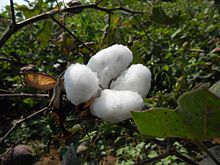- Cash crop
-
For the Rascalz album, see Cash Crop (album).Yerba mate (left), coffee and tea (right), all used for caffeinated infusions, have cash crop histories.
In agriculture, a cash crop is a crop which is grown for profit.
The term is used to differentiate from subsistence crops, which are those fed to the producer's own livestock or grown as food for the producer's family. In earlier times cash crops were usually only a small (but vital) part of a farm's total yield, while today, especially in the developed countries, almost all crops are mainly grown for cash. In non-developed nations, cash crops are usually crops which attract demand in more developed nations, and hence have some export value.
In many tropical and subtropical areas, jute, coffee, cocoa, sugar cane, bananas, oranges and cotton are common cash crops. In cooler areas, grain crops, oil-yielding crops and some vegetables and herbs are predominate; an example of this is the United States, where corn, wheat, soybean are the predominant cash crops. Coca, poppies and cannabis are other popular black-market cash crops, the prevalence of which varies. In the United States cannabis is considered by some to be the most valuable cash crop.[1]
Prices for major cash crops are set in commodity markets with global scope, with some local variation (called basis) based on freight costs and local supply and demand balance. A consequence of this is that a nation, region, or individual producer relying on such a crop may suffer low prices should a bumper crop elsewhere lead to excess supply on the global markets. This system is criticized by traditional farmers. Coffee is a major part of this.
Issues involving subsidies and trade barriers on such crops have become controversial in discussions of globalization. Many developing nations take the position that the current international trade system is unfair because it has caused tariffs to be lowered in industrial goods while allowing for low tariffs and agricultural subsidies for agricultural goods. This makes it difficult for a developing nation to export its goods overseas, and forces developing nations to compete with imported goods which are exported from developed nations at artificially low prices. The practice of exporting at artificially low prices is known as dumping, and is illegal in most nations. Controversy over this issue led to the collapse of the Cancún trade talks in 2003, when the Group of 22 refused to consider agenda items proposed by the European Union unless the issue of agricultural subsidies were addressed.
Cash crop production in the United States is an often debated subject between traditional farmers and local food enthusiasts who support solely local farming practices. Cash cropping in the United States came to the forefront after the Baby Boom generation and the end of World War II as a way to feed the large population boom and continues to be the main factor in having an affordable food supply in the United States. According to the 1997 Ag Census, 90% of the farms in the United States are still owned by families, with an additional 6% owned by a partnership.[2] Cash crop farmers are continually utilizing cutting edge technology combined with time-tested practices to produce healthy, affordable food.
Retrieved from Nepru Working paper #80, The Nambian Economic Policy Research Unit. Hopolang Phororo.
References
- ^ "Marijuana called Top US Cash Crop". 18 December 2006. http://abcnews.go.com/Business/story?id=2735017&page=1. Retrieved 1 January 2010.
- ^ http://www.epa.gov/agriculture/ag101/demographics.html
j
Categories:
Wikimedia Foundation. 2010.




